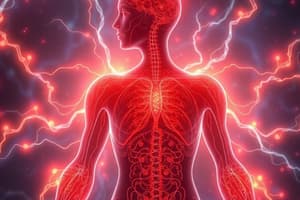Podcast
Questions and Answers
What is the current basis for defining the unit of insulin?
What is the current basis for defining the unit of insulin?
What happens to ATP-dependent potassium channels in response to hyperglycemia?
What happens to ATP-dependent potassium channels in response to hyperglycemia?
What is the effect of decreased outward potassium efflux on the beta cell?
What is the effect of decreased outward potassium efflux on the beta cell?
What is the stimulus for insulin secretion from pancreatic beta cells?
What is the stimulus for insulin secretion from pancreatic beta cells?
Signup and view all the answers
What percentage of insulin is cleared by the liver?
What percentage of insulin is cleared by the liver?
Signup and view all the answers
What is the half-life of circulating insulin?
What is the half-life of circulating insulin?
Signup and view all the answers
What is the normal range of basal serum insulin values?
What is the normal range of basal serum insulin values?
Signup and view all the answers
What happens to insulin after it enters the circulation?
What happens to insulin after it enters the circulation?
Signup and view all the answers
What are the three peptide hormones produced by the pancreas?
What are the three peptide hormones produced by the pancreas?
Signup and view all the answers
What is the effect of a lack of insulin in diabetes mellitus?
What is the effect of a lack of insulin in diabetes mellitus?
Signup and view all the answers
What is the purpose of administering insulin preparations or other glucose-lowering agents?
What is the purpose of administering insulin preparations or other glucose-lowering agents?
Signup and view all the answers
What is the structure of insulin?
What is the structure of insulin?
Signup and view all the answers
What is the function of insulin in the target tissues?
What is the function of insulin in the target tissues?
Signup and view all the answers
What is proinsulin processed into within the Golgi apparatus of beta cells?
What is proinsulin processed into within the Golgi apparatus of beta cells?
Signup and view all the answers
What is the effect of glucocorticoids on insulin receptors?
What is the effect of glucocorticoids on insulin receptors?
Signup and view all the answers
What is the form in which insulin is stored in granules within beta cells?
What is the form in which insulin is stored in granules within beta cells?
Signup and view all the answers
What is the amount of insulin in the entire human pancreas?
What is the amount of insulin in the entire human pancreas?
Signup and view all the answers
What is the result of aberrant serine and threonine phosphorylation of insulin receptor β subunits or IRS molecules?
What is the result of aberrant serine and threonine phosphorylation of insulin receptor β subunits or IRS molecules?
Signup and view all the answers
What was the original basis of defining the unit of insulin?
What was the original basis of defining the unit of insulin?
Signup and view all the answers
What is the projected number of people affected by diabetes worldwide by 2030?
What is the projected number of people affected by diabetes worldwide by 2030?
Signup and view all the answers
What is the primary cause of type 1 diabetes?
What is the primary cause of type 1 diabetes?
Signup and view all the answers
What is the classification of diabetes with genetic defects or medications?
What is the classification of diabetes with genetic defects or medications?
Signup and view all the answers
What is the characteristic of immune-mediated type 1 diabetes?
What is the characteristic of immune-mediated type 1 diabetes?
Signup and view all the answers
What is the classical symptom of type 1 diabetes?
What is the classical symptom of type 1 diabetes?
Signup and view all the answers
What level of urinary ketones requires hospitalization?
What level of urinary ketones requires hospitalization?
Signup and view all the answers
What is the purpose of self-monitoring of blood glucose?
What is the purpose of self-monitoring of blood glucose?
Signup and view all the answers
What is the function of continuous glucose monitoring (CGM) systems?
What is the function of continuous glucose monitoring (CGM) systems?
Signup and view all the answers
What is the purpose of a glucose pump?
What is the purpose of a glucose pump?
Signup and view all the answers
When is regular insulin administered intravenously?
When is regular insulin administered intravenously?
Signup and view all the answers
How is human insulin produced?
How is human insulin produced?
Signup and view all the answers
What is the result of modifying the amino acid sequence of human insulin?
What is the result of modifying the amino acid sequence of human insulin?
Signup and view all the answers
What is the availability of animal insulin in the United States?
What is the availability of animal insulin in the United States?
Signup and view all the answers
What is the primary purpose of a sliding scale insulin regimen?
What is the primary purpose of a sliding scale insulin regimen?
Signup and view all the answers
What does the basal insulin dose not change with in a sliding scale insulin regimen?
What does the basal insulin dose not change with in a sliding scale insulin regimen?
Signup and view all the answers
What is the limitation of sliding scale insulin therapy in covering a pre-meal high blood sugar?
What is the limitation of sliding scale insulin therapy in covering a pre-meal high blood sugar?
Signup and view all the answers
What is the ratio of insulin to carb in a 1:10 insulin to carb ratio?
What is the ratio of insulin to carb in a 1:10 insulin to carb ratio?
Signup and view all the answers
What is the total daily insulin requirement for a person weighing 160 lbs according to the formula?
What is the total daily insulin requirement for a person weighing 160 lbs according to the formula?
Signup and view all the answers
What is the target blood sugar level for type I DM as per ADA?
What is the target blood sugar level for type I DM as per ADA?
Signup and view all the answers
What is the disadvantage of sliding scale insulin therapy in terms of snacks and physical activity?
What is the disadvantage of sliding scale insulin therapy in terms of snacks and physical activity?
Signup and view all the answers
What is the biological equivalent of 1 IU of insulin?
What is the biological equivalent of 1 IU of insulin?
Signup and view all the answers
Study Notes
Insulin and Glucose Lowering Agents
- The pancreas produces peptide hormones: insulin, glucagon, and somatostatin, which play a crucial role in regulating metabolic activities, particularly glucose homeostasis.
- Insulin is a small protein containing 51 amino acids arranged in two chains (A and B) linked by disulfide bridges.
- Proinsulin is processed within the Golgi apparatus of beta cells and packaged into granules, where it is hydrolyzed into insulin and a residual connecting segment called C-peptide.
- Insulin and C-peptide are secreted in equimolar amounts in response to all insulin secretagogues.
Mechanism of Insulin Release
- Hyperglycemia results in increased intracellular ATP levels, which close ATP-dependent potassium channels, leading to depolarization of the beta cell and opening of voltage-gated calcium channels.
- The resulting increased intracellular calcium triggers the secretion of insulin.
Insulin Secretion
- Insulin is released from pancreatic beta cells at a low basal rate and at a much higher stimulated rate in response to various stimuli, including glucose, other sugars, amino acids, and hormones like glucagon-like polypeptide 1 (GLP-1) and glucose-dependent insulinotropic polypeptide (GIP).
- Insulin secretion is also stimulated by high concentrations of fatty acids and β-adrenergic sympathetic activity.
Insulin Degradation
- The liver and kidney are the two main organs that remove insulin from the circulation, with the liver clearing 60% of the insulin released from the pancreas and the kidney removing 35-40% of the endogenous hormone.
- The half-life of circulating insulin is 3-5 minutes.
Insulin Receptor
- Insulin receptors are found on the membranes of most tissues, and the biologic responses promoted by these insulin-receptor complexes have been identified in the primary target tissues regulating energy metabolism, including liver, muscle, and adipose tissue.
Effects of Insulin on Its Targets
- Insulin promotes the storage of fat as well as glucose within specialized target cells and influences cell growth as well as the metabolic functions of a wide variety of tissues.
Diabetes Mellitus
- Diabetes mellitus is a rapidly growing health problem that affects more than 350 million people worldwide, with elevated blood glucose associated with absent or inadequate pancreatic insulin secretion with or without impairment of insulin action.
- The American Diabetes Association (ADA) recognizes four clinical classifications of diabetes: type 1, type 2, gestational diabetes mellitus, and other causes like genetic defects or medications.
Type 1 Diabetes
- Type 1 diabetes is characterized by selective B cell destruction (severe or absolute insulin deficiency) and is further subdivided into immune-mediated (type 1a) and idiopathic (type 1b) forms.
- Classical symptoms of type 1 diabetes include polydipsia, polyphagia, polyuria, and weight loss.
- Type 1 diabetes requires exogenous insulin to treat hyperglycemia and life-threatening ketoacidosis.
Self-Monitoring of Blood Glucose
- Capillary blood glucose measurements performed by patients themselves, as outpatients, are extremely useful in type 1 patients in whom "tight" metabolic control is attempted.
- Continuous glucose monitoring (CGM) systems are also available for clinical use, utilizing a subcutaneous sensor that measures glucose concentrations in the interstitial fluid for 3-7 days.
Medications for Hyperglycemia
- Human insulin is produced by recombinant DNA technology using strains of Escherichia coli or yeast that are genetically altered to contain the gene for human insulin.
- Modification of the amino acid sequence of human insulin produces insulins with different pharmacokinetic properties.
- Insulin preparations vary primarily in their onset and duration of activity.
Pharmacokinetics
- Insulin is generally administered by subcutaneous injection, although an inhaled insulin formulation is also available.
- Sliding scale insulin regimens approximate daily insulin requirements, depending on pre-defined blood glucose ranges for pre-meal or night time insulin dose.
Sliding Scale Insulin Therapy
- Disadvantages of sliding scale therapy include:
- Not covering insulin needs related to snacks or stress and other activity
- Requiring carbohydrate counting
- Being less effective in covering a pre-meal high blood sugar
- Requiring a consistent diet and lifestyle
- Sliding scale protocols (Bolus) involve calculating the dose of insulin based on the carbohydrate content of the meal and the blood glucose level.
Dose Calculation
- The carbohydrate coverage dose is a bolus dose for food coverage, prescribed as an insulin-to-carb ratio.
- The total daily insulin requirement can be calculated using formulas such as Total units daily = weight in pounds / 4 or Total units daily = weight in kg x 0.55.
Studying That Suits You
Use AI to generate personalized quizzes and flashcards to suit your learning preferences.
Description
Learn about the role of insulin and glucagon in regulating glucose homeostasis and metabolic activities in the body. This quiz covers the production and function of these peptide hormones.



